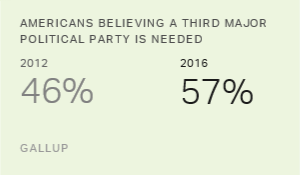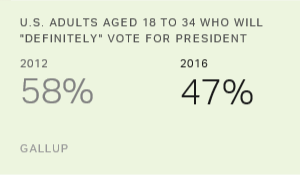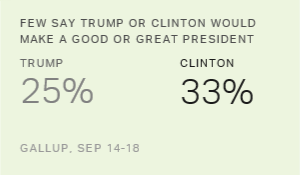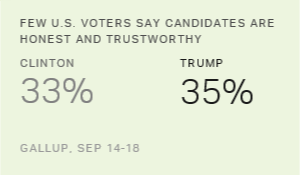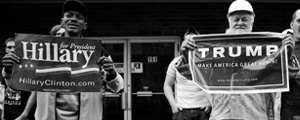Story Highlights
- 57% say a third major party is needed
- In 2008 and 2012, less than half favored a third party
- Just over half of Republicans favor a third party
PRINCETON, N.J. -- A majority of Americans, 57%, continue to say that a third major U.S. political party is needed, while 37% disagree, saying the two parties are doing an adequate job of representing the American people. These views are similar to what Gallup has measured in each of the last three years. However, they represent a departure from public opinion in 2008 and 2012 -- the last two presidential election years -- when Americans were evenly divided on the need for a third party.
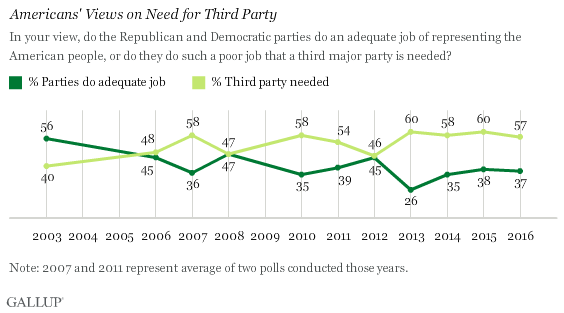
These results are based on Gallup's annual Governance poll. The poll was conducted Sept. 7-11, at a time when Americans' views of the Republican and Democratic parties are near historical lows, and when Americans hold highly negative opinions of both major-party presidential nominees. In 2008 and 2012, Americans' favorable ratings of the parties were slightly more positive than today, but their favorable ratings of the presidential candidates were far better.
In those years, third-party presidential candidates received less than 2% of the popular vote for president. This year, third-party candidates are getting about 10% of the vote combined in presidential preference polls. Should that level of support hold between now and Election Day, it would be the strongest performance for third-party candidates since the 1992 and 1996 campaigns, when Ross Perot ran for president.
When Gallup first asked Americans about the need for a third party in 2003, a majority said the parties were doing an adequate job, leaving 40% advocating for a third party. By 2006, Americans were evenly divided, but they have shown a clearer preference for a third party since then, apart from 2008 and 2012.
Half of Republicans Say Third Party Needed
As might be expected, independents have consistently been most likely among the major political groups to believe a third party is needed. Currently, 73% of independents, 51% of Republicans and 43% of Democrats favor the formation of a third party. Republicans' preference for a third party today ranks among the highest Gallup has found for a partisan group, along with a 52% reading among Republicans in 2013 and 50% for Democrats in 2006.
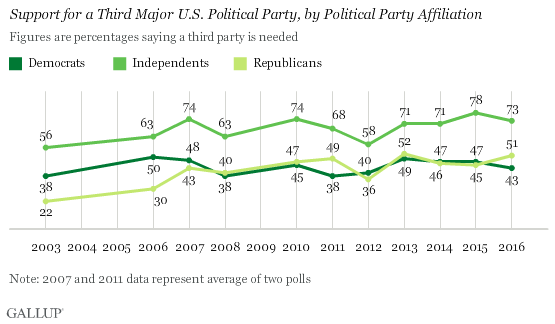
In the 2008 and 2012 presidential election years, the decline in support for a third party was the result of a sharp drop from the prior year among independents, coupled with a similar, double-digit drop among the major-party group looking to win control of the White House -- Democrats in 2008 and Republicans in 2012.
This year, independents' desire for a third party declined only modestly, from 78% in 2015 to 73%, while Democrats' desire also declined slightly and that of Republicans increased. The increase could reflect some Republicans' frustration with the party's internal divisions, both between conservatives and party leaders in government, and between party establishment figures and Donald Trump.
Implications
Americans' usual preference for a third major political party had subsided in the last two presidential election years, but that pattern did not repeat itself this year. In 2008 and 2012, Americans' general contentment with the major-party nominees may have led them to believe the parties were doing an adequate job of representing their views, and thus there was little appetite for a third party. This was the case in 2012, even as the well-funded "Americans Elect" movement aimed at providing the infrastructure for a credible third-party candidate could not field a viable candidate.
The political environment is different this year, with Hillary Clinton's favorable ratings struggling to break 40%, while Trump's have been stuck even lower at around 33%. Four years ago, Gary Johnson and Jill Stein combined for just over 1% of the national popular vote as the Libertarian and Green Party presidential nominees, respectively. This year, with those two third-party candidates nominated again, their support in pre-election polls among likely voters is nearly 10%.
Those polls portend a significant increase in the third-party vote this year, but well short of what it would take any third-party candidate to win the election. Their main impact on the outcome would likely be to play "spoiler" by taking away enough votes from one major-party candidate to allow the other to prevail.
With 57% of Americans favoring a third major political party, but only about one in 10 voters currently saying they will vote for a third-party candidate, Americans' appetite for a third party may not be as great as they say it is. The gap between preference for a third party and support for third-party candidates in this year's election may also reflect the structural challenges third parties face, Americans' unfamiliarity with the third-party candidates and possibly Americans' reluctance to cast their vote for a candidate with little chance of winning.
Historical data are available in Gallup Analytics.
Survey Methods
Results for this Gallup poll are based on telephone interviews conducted Sept. 7-11, 2016, with a random sample of 1,020 adults, aged 18 and older, living in all 50 U.S. states and the District of Columbia. For results based on the total sample of national adults, the margin of sampling error is ±4 percentage points at the 95% confidence level. All reported margins of sampling error include computed design effects for weighting.
Each sample of national adults includes a minimum quota of 60% cellphone respondents and 40% landline respondents, with additional minimum quotas by time zone within region. Landline and cellular telephone numbers are selected using random-digit-dial methods.
View survey methodology, complete question responses and trends.
Learn more about how the Gallup Poll Social Series works.
